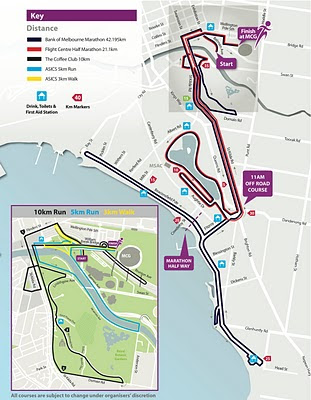Pacing - Melbourne Marathon

My Plan
I want to run a PB. That means faster than 2:58:44. Unfortunately training hasn't gone as hoped, and to be realistic, this year I do not have the fitness and performance level required to be confident in achieving this. Exactly what level I am at I really don't know. As a result my pacing plan won't purely revolve around the clock. I need to take other cues.
Risks
My endurance threshold is lower than in 2009. As a result, if the early pacing is slightly high, or even if I am close to my most appropriate level I am quite likely to have a significant slow down in the latter portion. This will either be from simply a lack of specific muscular endurance and/or from hitting the wall by burning through my carbohydrate too quickly. On the other hand, running slower over the first portion to try to reduce the slow-down risk will result in early time loses that are very unlikely to able to made up in the final kilometers.
The Course

The Melbourne Marathon is almost entirely flat. The first half as a slight overall altitude drop. At just before 30km and particularly after 35km there is some mild uphill that will suck a lot of pace out of the legs and increase the likelihood of hitting the wall at the point in the race where it is already most likely. Therefore working from +/-2% rule on pacing, it would be appropriate to aim to work on the faster end of the range for the first 20-25km. Then be comfortable with running at the opposite end of the pace range in the slower portion.
Cues
Since I won't know exactly what pace I should be running out until near the end of the marathon. The simple overview of the plan is start out and what feels like right pace to maintain for the majority, then repeatedly work through a checklist and adjust from there.
First 5km I will be looking at working myself into a rhythm. If anything I aim to start off a bit too slow and build up from there. I will look at the 1km splits just to make sure I am not ridiculously fast or slow. As I close in on the 5km mark, my heart rate should have settled in and be a reflection on the intensity I am working at. From the 5km mark and taking particular note of the pace over last 2km I will then adjust things for the race proper.
My expectations will be that my heart rate should be sitting somewhere in the 150's. If the pace is good and my HR is lower then that's a bonus. If I am already creeping into 160's then it is highly likely I am working too hard and will pay the price later.
As far as pace is concerned, I have to run with the concept that it is what it is. That said there will be a few numbers that I will have sitting in my head. 4:13/km or 21:05 per 5km is the minimum I have to be running at to scrape in a PB. To keep the mathematics easy during the race I will work off 21:00 per 5km. At this stage I don't know if I can hold it, but it is a benchmark. As a minimum, I'm sure I will be uncomfortable with the concept of running slower than 21:19 per 5km (3hr pace).
Working from this benchmark, and applying the +/-2% concept the pacing range would be 4:08-4:18/km (20:40-21:30/5km) for a 4:13/km (21:05/5km) average. Taking this concept from a different angle, the pace variance shouldn't be more than 5 seconds per kilometer either way. If I am running at close to my marathon limit, then it would be reasonable to assume an average drop of 10 seconds/per from the first 10-20km running to the final 10km. All this is just theory, but thinking about it prior to being the course means I will have some solid reality checks to work from during the race. Hopefully it will help keep me close to the best pace I am capable of on the day.
Process
I've covered what I need to keep in mind regarding the clock. That is the end result, and this year because of training, I have to focus on the how I get there more before. In 2009 I was in such good shape, that I almost didn't have to think about how I was running, and just keep an on pace, nutrition and hydration. The running just came naturally. This year I will have to concentrate a lot more on my technique and rhythm. The posture and relaxation checklist will be an almost continuous process. Every few minutes I will be asking myself "am I getting the most efficient speed I can?" If not, then I will make the adjustments necessary.
Initially I will focus on finding that all important rhythm. Then find the adjustments to move that rhythm into a good race pace. The work will be on holding everything in the zone for the first 25km. Beyond there things should start getting harder. This is a section where time can creep away from you before you realise it. With a little more uphill, the beginnings of marathon fatigue, it is easy to drop 10-15 seconds/km without feeling like it. Then at some point, be it, 30, 32, 35km or even later the marathon typically will hand out what is famous for. I have been there a number of times before. I have strategies to handle and mitigate the so-called wall. A lot will come done to just sucking it pushing through to the end.


interesting read!
ReplyDelete